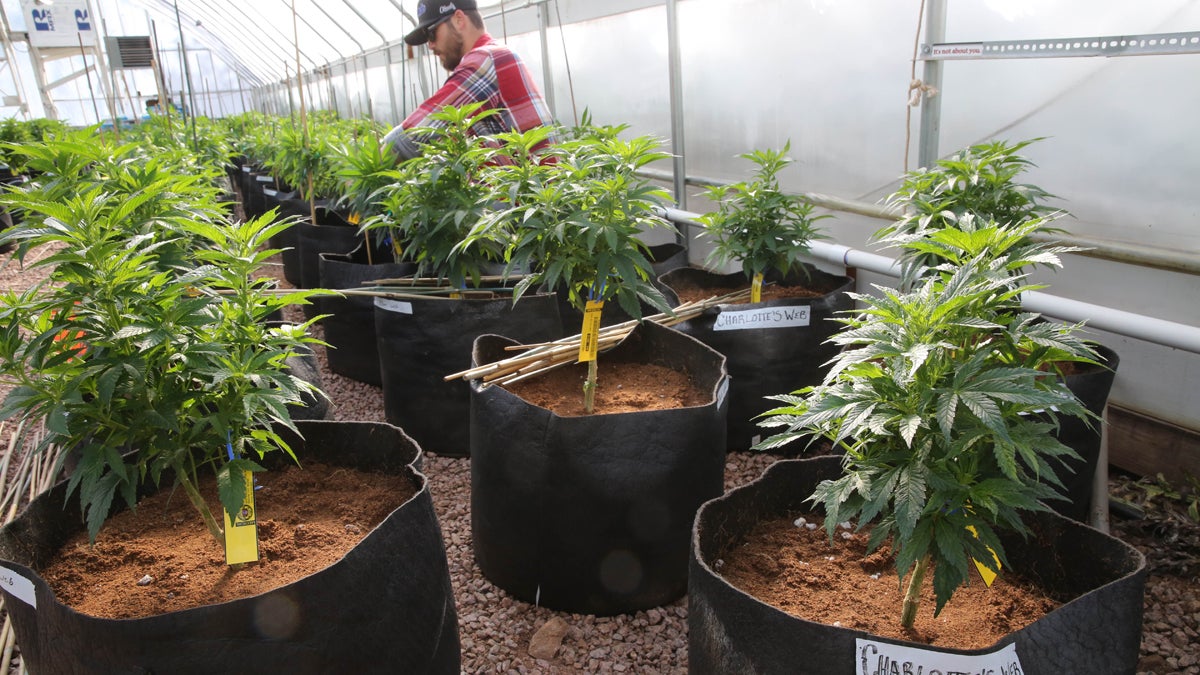Feds ease rules for health research on marijuana extract

A worker cultivates a special strain of medical marijuana known as Charlotte's Web inside a greenhouse, in a remote spot in the mountains west of Colorado Springs, Colorado. (Brennan Linsley/AP Photo, file)
The U.S. Drug Enforcement Administration is easing the rules for researchers who study an extract of the marijuana plant.
The change means less paperwork for researchers when they change the study dosage of CBD — or cannabinol — an active chemical in marijuana. Some health researchers think the component could be used as a seizure treatment without producing a side effect “high.”
The Pennsylvania Medical Society applauded the change in a press statement: “Pennsylvanian physicians overwhelmingly prefer additional research and clinical study on the medical use of cannabis before the state moves to permit its medical use.”
Tom Angell, who leads the nonprofit group Marijuana Majority, called the DEA’s recent move a very small step in the right direction.
“It will make research into CBD ever so slightly easier for scientists who are examining its medical benefit,” Angell said. “There’s a lot more we’d like to see the Obama administration do to open up access to medical marijuana to patients that need it.”
The DEA’s new rule only applies to CBD, not THC –tetrahydrocannabinol — the component of marijuana that causes psychological effects. By email, Mason Tvert, spokesman for the Marijuana Policy Project, said that omission suggests that agency officials are “still not ready to take a rational approach to marijuana-related research.”
Some patients will need both THC and CBD, Tvert said.
“What about researchers who might want to study both?” he said.
The Marijuana Policy Project has compiled an online list of federal barriers to medical marijuana research.
One DEA restriction requires investigators to purchase study marijuana from a facility at the University of Mississippi. But researchers have complained that the one-source “monopoly” deters interest in medical marijuana studies, Angell said.
“There’s a lot of sort of bureaucratic hoops you need to jump through since marijuana is irrationally a Schedule 1 narcotic,” said state Sen. Daylin Leach, who is leading the push to approve medical marijuana in Pennsylvania.
“What we really need is to have the Schedule 1 designation just eliminated,” said Leach, D-Montgomery.
A Schedule 1 designation means marijuana is among the class of drugs considered the most dangerous with a high potential for abuse or dependence.
Recent reports suggest that the Food and Drug Administration has sent a recommendation to the DEA to reschedule marijuana, but it’s not clear in what category health officials think pot should be placed.
“Two of the things we try to balance when we think about the safety of using these drugs, either as research tools or as medications, is balancing the likelihood that someone may go on to abuse, become dependent or become addicted to a drug in relation to the potential therapeutic benefit,” said behavioral pharmacologist Sara Jane Ward, a researcher with the Center for Substance Abuse Research at the Lewis Katz School of Medicine at Temple University.
“Most of my colleagues in the field of studying cannabinoids, really strongly believe that is should be scheduled down from a Schedule 1,” she said.
Ward studies how different drugs affect the body. Though her work is with animals rather than humans, she said it took many months to become registered as an approved cannabinoid researcher.
WHYY is your source for fact-based, in-depth journalism and information. As a nonprofit organization, we rely on financial support from readers like you. Please give today.

